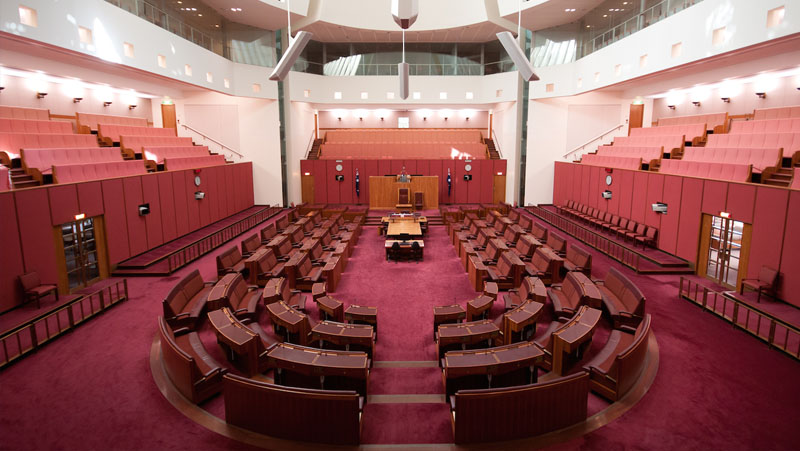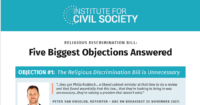This is a submission prepared for the Senate Standing Committee on Legal and Constitutional Affairs. On 6 December 2018, the Senate referred the Sex Discrimination Amendment (Removing Discrimination Against Students) Bill 2018 and all circulated amendments to the bill to the Legal and Constitutional Affairs Legislation Committee. A PDF of the submission can be found here.
Executive Summary
The Institute for Civil Society (ICS) offers the Committee the following detailed examination of the “Sex Discrimination Amendment (Removing Discrimination Against Students) Bill 2018”.
The ICS considers the Bill dangerous and inimical to freedom of religion including the freedom of religious parents to have their children educated in their moral and religious beliefs and the freedom of association of religious parents, students and teachers to choose to associate in religious bodies or educational associations which can freely reflect, model and teach their religious beliefs and behavioural standards. Some of the amendments improve the Bill, some worsen its effect. None of them is sufficient to remove its problems. ICS recommends that the Bill be not considered until there is bipartisan agreement about how to implement the various recommendations in the Expert Panel on Religious Freedom’s report. The Bill and the amendments have all been brought forward hastily and without enough consideration given to the legal and policy ramifications. This issue should go to the ALRC, as the government has suggested, and be considered in the light of broader considerations of the Ruddock Expert Panel Report.
However, if the Bill is to be considered, we offer a number of observations and suggestions which we trust will assist the Committee’s consideration of the Bill.
The first problem with the Bill is that the amendments to section 37 and 38 do not differentiate amongst the many different decisions or activities of a religious educational authority or religious body which could fall within the Sex Discrimination Act’s very broad meaning of “discrimination”. For example, the Act defines discrimination by educational authorities to include:
- denying the student access, or limiting the student’s access, to any benefit provided by the educational authority;
- subjecting the student to any other detriment.
To expel a student from a religious school solely on the grounds of sexual orientation is a hypothetical which doesn’t happen but which ought to be prohibited discrimination. But that is completely different from a decision of a religious school on the grounds of upholding the religious values of the school to refuse permission for a sexually active student (straight or gay) or gender transitioning student to run a club or publish posters or webpages at the school advocating for sex outside marriage (straight or gay) or gender fluid ideology. Such a decision is “discrimination” because it fits the very broad phrases “denying the student access to a benefit” or “subjecting the student to any detriment”. But the decision is reasonable and appropriate discrimination designed to uphold the school’s religious values which the parents pay fees to have taught and modelled to students at the school. Yet the Bill would prohibit such decisions. (Senator Wong and the government’s amendment assumes that the type of decision discussed is always under a general policy and treated as indirect discrimination which is subject to a reasonableness defence (section 7B), whereas the decision may be an individual one off and direct discrimination which is not subject to any reasonableness defence.)
The second problem with the Bill is that the amendment to section 38 concerning religious educational authorities it is not confined to educational authorities which are schools for people under 18. It applies to theological colleges and religious training colleges for missionaries, chaplains, youth workers and pastoral care workers. Why? The same issue arises. Surely a religious educational college can expound and model the religion’s views of sexual morality without being faced with a discrimination lawsuit if it subjects a student to a detriment by prohibiting advocacy within the college for alternative views? Why is the Bill seeking to regulate what are permissible views on sexual morality in theological colleges and colleges for training missionaries and chaplains?
The third problem with the Bill is the amendment to section 37 removes exemptions for “any act or practice connected with the provision by the religious body of education”. Although that may have been conceived as a backup for the section 38 amendment for schools, it is extremely broad language. An act or practice connected with the provision by a religious body of education would include the preparation and delivery of content (and selection of teachers) for Sunday school, Koran Classes, Torah classes, youth group classes and teaching sermons in a church, mosque, synagogue or temple. The Bill strikes at the heart of religious freedom by seeking to regulate the content and presenters of religious teaching in religious bodies.
Furthermore, the Bill is not fixed by the tabled amendments. If the Committee wishes we can appear in person to explain why the amendments are not sufficient to remove the problems caused by the Bill.
In our view, the Bill should be withdrawn and the issues of students in religious schools subjected to careful consideration by the ALRC.
Summary of the Bill
The Sex Discrimination Amendment (Removing Discrimination Against Students) Bill 2018 (“the Bill”) is intended to stop religious schools from expelling gay and lesbian students because of their sexual orientation. The Bill makes the following two amendments to the Sex Discrimination Act 1984 (“the Act”):
- Adds a sub-section to s 37 of the Act, which removes the exemptions in s 37(1)(d) which implicitly cover religious educational institutions, by specifying that the exemptions do not apply to acts and practices of “a body established for religious purposes” established to provide education. It should be noted that the Bill specifies that this new sub-section does not affect employment decisions or practices.
- Repeals s 38(3) of the Act, which allows for religious educational institutions to discriminate against students based on the person’s sex, sexual orientation, gender identity, intersex status, marital or relationship status, pregnancy or potential pregnancy, or breastfeeding.
Analysis of the Bill
Contrary to the recommendations of the Ruddock Panel on Religious Freedom, the ALP (through Senator Wong) has introduced a Bill into the Senate to amend the Sex Discrimination Act to severely limit the freedoms of:
- religious schools and parents who send their children there;
- religious adult colleges and training institutions for missionaries, chaplains and religious workers (including theological colleges); and
- all religious bodies like churches, mosques, synagogues and temples to provide education services to their members and the public through sermons, religious education classes for children, youth or adults and courses on issues like marriage, family and relationships.
The Bill is intended to stop religious schools from expelling gay and lesbian students because of their sexual orientation. Religious schools don’t actually do this. Even so, if that was all the Bill did there would be no issue – it would simply remove a hypothetical risk. However, the Bill goes much further.
It restricts the freedom of religious schools, adult colleges and religious bodies to teach and model the values of the religion in any way that can be perceived to be discriminatory against people on the grounds of their gender, sexual orientation, relationship status or gender identity. There is the problem. Many (not all) religious schools, colleges and religious bodies hold and teach and model views about the morality and wisdom of types of sexual behaviour, family structures and the nature of gender which are very different to secular progressive activists.
For example, those religious schools, colleges, mosques, churches and temples teach and set behavioural standards for students or congregations based on the view that human flourishing is promoted by divine design that sexual relations should be limited to male-female marriage and that there are only two genders; that is, male and female. But that teaching and those behavioural policies can be treated as discriminating against gay and lesbian people, heterosexual people who have sex outside marriage and people who identify as gender-fluid. If the Bill is enacted, such teaching and policies will be subject to anti-discrimination complaints and lawsuits.
In a pluralist society, different groups hold and teach and live by different views on these issues. 4.8 million Australians (38.4%) voted against same-sex marriage. Whether one agrees with them or not, they have as much right to hold that view, live by it, and have their children educated according to it, as those who voted for same-sex marriage. If we do not accommodate a diversity of worldviews and life choices based on them for individuals and voluntary associations of individuals, we are not a pluralist society.
We rightly have anti-discrimination laws to stop governments, supermarkets and insurance companies refusing to supply services to the public on the grounds of their gender or sexual orientation or gender identity. That is about equality of opportunity for all to participate in the economy and the public square.
But anti-discrimination law goes way beyond its proper boundaries when it dictates to voluntary associations of people formed to express and teach and model a set of religious beliefs and behaviours, that they must accept or even promote teaching and expression of beliefs and behaviour which is completely contrary to their religious beliefs and behaviours. Religious bodies and religious schools and colleges are one type of voluntary association dedicated to promoting and modelling particular views of human flourishing. No parent is forced to send their child to a religious school or keep them there. No-one is compelled to join or remain in a religious body.
That is why anti-discrimination laws all contain exemptions or balancing provisions to allow religious bodies and religious schools to organise their teaching and behavioural standards in accordance with their religious beliefs and values on human flourishing.
However, the Bill would remove or limit the current exemptions in the Sex Discrimination Act so that religious schools, colleges and religious bodies will be subject to anti-discrimination complaints and lawsuits when they teach or set behavioural standards which are contrary to secular liberal views on sexual relations and gender identity.
Separation of religious institutions and the State works both ways. Religious institutions should not interfere in the running of the State and the State should not interfere in the teaching of religious groups and the teaching and modelling of religious values in their schools. On disputed matters such as sexual morality and family structure, the State should not be telling religious bodies or religious schools whether their religious values and their policies to uphold them are “reasonable” in the eyes of the State through an anti-discrimination commission or a court.
Having given an overview analysis of the Bill, we will now move to identify some particular ways that it undermines religious institutions.
1. Religious Schools and adult training colleges are exposed by the proposed removal of s 38(3) of the Sex Discrimination Act
Section 21 of the Sex Discrimination Act prohibits educational authorities from discriminating against staff or students on the grounds of their gender, relationship status, sexual orientation or gender identity.
Section 38(3) of the Act is an exemption for religious educational authorities which operate an educational institution in accordance with the doctrines, tenets, beliefs or teachings of a particular religion or creed. The exemption allows them to discriminate against a student or applicant to be a student on the ground of that person’s sex, sexual orientation, gender identity, marital or relationship status or pregnancy. However, it only allows for this if the discrimination is in good faith in order to avoid injury to the religious susceptibilities of adherents of that religion or creed. An example would be a school rule that a student should not engage in sexual activity or promote the value of a sexual activity contrary to the teachings of the religion.
The types of discrimination exempted by section 38(3) are:
- refusing to admit a person as a student and
- denying the student access, or limiting the student’s access, to any benefit provided by the educational authority;
- expelling the student; or
- subjecting the student to any other detriment.
The Bill would remove the exemption in s 38(3) and expose schools to direct and indirect discrimination claims. The Government’s proposed amendments moderate this somewhat.
In a previous submission to this Committee (on the “Inquiry into legislative exemptions that allow faith-based educational institutions to discriminate against students, teachers and staff”), we argued that these exemptions in s 38(3) serve the useful purpose of enabling religious schools and adult education institution to protect their religious values and ethos. But their wording is clunky and could be refined or even replaced by a positive legal right of religious schools to make decisions and set policies which uphold the teachings and values of the religion. Until someone proposes that positive right or freedom be enacted in legislation (e.g. a Religious Freedom Act), the exemptions will still be needed.
For example, issues arise for discipline and value-setting in religious schools, not just the hypothetical issue of expelling students purely for sexual orientation. Taking away the exemption in section 38(3) means that if a religious school, acting on the basis of its religious beliefs:
- refuses permission for a sexually active student (straight or gay) or gender transitioning student to run a club or publish posters or webpages at the school advocating for sex outside marriage (straight or gay) or fluid gender ideology; or
- refuses permission for a same-sex-oriented student to take a same-sex romantic partner to the school formal; or
- requires a male student who wishes to publicly identify as female and whose appearance is male and has not had sex reassignment or cosmetic surgery to use the male change rooms and toilets rather than the female ones, and to be addressed by the male pronoun;
the school is “subjecting the student to a detriment” on the grounds of relationship status or sexual orientation or gender identity and can be sued under s 21 of the Sex Discrimination Act.
The above decisions may present as a case of direct discrimination against the particular student. If the school had developed a general policy about school formals or student posters, some of these cases might present as a case of indirect discrimination but many of them will be direct discrimination cases.
Removing the exemption undermines the authority of the school to operate in accordance with the values of the religion and turns matters of school discipline into a complaint to the Human Rights Commission and lawsuits in the Federal Court.
One may or may not agree with any such decisions by a religious school. But the key question is whether, in a pluralist democracy, a religious school should be free to make such decisions in good faith on the basis of its religious beliefs to uphold the values of the religion and the ethos of the school. It is not compulsory to attend or remain at a religious school – that is a voluntary choice for parents and older students, and the public school system is open to all. The values and ethos of a religious school are one of the reasons parents (and grandparents) choose religious schools and pay fees on top of their taxes so their children can attend.
Senator Wong stated that under the Bill the school can still defend its general policies from claims of indirect discrimination in a tribunal or court on the grounds that the policy is “reasonable” under section 7B. Even if some of these cases are indirect discrimination based on a general school policy rather than direct (and only some of them will be) so that the school could argue that its policy is “reasonable”, that is still a major reduction in religious freedom of religious schools and the parents who pay to send their children there.
Currently the Act, as enacted by both Coalition and ALP governments, allows a religious school that operates in accordance with the doctrines, tenets, beliefs or teachings of a particular religion or creed, to engage in an act or practice which discriminates against another person only if the discrimination is in good faith in order to avoid injury to the religious susceptibilities of adherents of that religion or creed.
The beliefs and teachings of the religion and injury to the religious susceptibilities of adherents are more or less objectively ascertainable and decide the issue – these criteria don’t give Anti-discrimination Commissions and courts much scope to impose their own views about the reasonableness of religious beliefs on religious schools. But the s 7B reasonableness test requires Anti-discrimination Commissions and courts to determine whether in their opinion the disadvantage to a student is proportionate to the result sought by the school which imposes the policy.
In this broad delegation of decision-making discretion to commissions and courts under s 7B, the beliefs of the religion and injury to adherents of the religion become just one of many factors. So the religious freedom of religious schools becomes subject to what a secular anti-discrimination commission or court thinks is reasonable and proportionate based on secular reasoning.
2. The exemption in s 38(3) which the Bill removes applies not just to schools but to all educational institutions conducted in accordance with religious beliefs. These include training colleges for missionaries, chaplains, counsellors, youth workers or pastoral care workers and general adult religious education and theological colleges.
“Educational institution” is defined to mean a school, college, university or other institution at which education or training is provided.
Removing s 38(3) means that a religious college or training institution for missionaries, chaplains, counsellors, youth workers or pastoral care workers and general adult religious education will be subject to lawsuits if it positively selects for students whose relationship status and sexual expression (whether straight or gay) model the values of the religion or if it requires students not to advocate for sexual expression (whether straight or gay) which is contrary to the values of the religion.
The only exemption left will be for training of persons to become ordained ministers of religion. But it is perfectly reasonable for religious training institutions which train people who will be ambassadors for the religion (like missionaries, chaplains, youth workers and counsellors) to require those people to conform to the religion’s values on relationship status and sexual expression.
Bodies like theological colleges (e.g. Salvation Army Training College, Islamic Sciences and Research Academy, Church Missionary Society Training College) will all have to comply with the Sex Discrimination Act’s position on relationships, sexual orientation and gender identity even if that position is completely contrary to the foundational teachings of the religion (the only remaining exception will be for training persons to become ordained ministers of religion).
That would strike at the heart of religious freedom. A religious community should be entitled to train its future educators, youth workers, chaplains and missionaries in accordance with the values of the religion without having to deal with lawsuits under the Sex Discrimination Act.
3. Education services provided by churches, mosques, temples and synagogues (not through educational institutions) will become subject to the Sex Discrimination Act under the Bill’s proposed amendment to s 37(1)(d) of the Act.
The Bill will constrain religious freedom by removing exemptions in s 37(1)(d) for the acts and practices of any religious body like a church, mosque, synagogue or temple if the acts or practices are connected with the provision by the body of education.
Discrimination in the provision of services including education services (whether paid or unpaid) on the grounds of sex, relationship status, sexual orientation and gender identity is prohibited by s 22. Education services provided by the local church, mosque or synagogue or temple would seem to include instruction for ordinary members of the religion in the religion (e.g. Sunday school or other children’s or youth instruction in the religion, classes on the Koran or the Bible or on marriage or sexual relations). Sermons seem likely to be caught as “an act or practice connected with the provision by the religious body of education” under the proposed amendment to s 37 of the Sex Discrimination Act.
A religious body could discriminate in the provision of such education services (or the facilities through which they are provided) under s 22 of the Act in several ways:
- by the manner in which the religious body provides the other person with those services or makes those facilities available to the other person (e.g. the manner of the sermon or teaching is discriminatory because the content of the teaching based on sacred scriptures is critical of same-sex marriage or of the behaviour of those having sex outside marriage (straight or gay) but not of other forms of sexual behaviour, or because the teaching criticises the idea and practice of gender transitioning.
- by refusing to provide a person with those services or to make those facilities available to the other persons (e.g. the religious body provides separate training on marriage, relationships and sexuality to men only and women only groups, or refuses to provide training on relationships to people known to be actively engaged in extramarital sex);
- in the terms or conditions on which the religious body provides the other person with those services or makes those facilities available (e.g. the religious body requires attendees at the training to affirm that they are living godly lives in accordance with the teachings of the religion including on relationships and sexuality).
4. Human Rights analysis of the Bill shows significant shortcomings[i]
ICS considers that the Bill:
- trespasses unduly upon several rights and freedoms including some of Australis’s international human rights obligations; and
- contains unjustified limitations on several human rights.
The International Covenant on Civil and Political Rights (ICCPR) article 18(4) obliges Australia to have respect for the liberty of parents and, when applicable, legal guardians to ensure the religious and moral education of their children in conformity with their own convictions. ICCPR Article 26 contains a protection against discrimination but that must be read subject to the other rights in the ICCPR including Article 18(4).
The UN Declaration on the Elimination of All Forms of Intolerance and of Discrimination Based on Religion or Belief article 5(2) provides that: “Every child shall enjoy the right to have access to education in the matter of religion or belief in accordance with the wishes of his or her parents.”
The current exemptions protect a religious body or school from being forced to accept the promotion of views and examples of students which are opposed to its religious values and ethos.
However, the Bill will curtail the ability of religious schools to require students to conform to standards of behaviour consistent with the beliefs of the religion. If the Bill is enacted, a student who wanted to start a Gay Pride Club or a Gay Pride page on the student intranet to promote LGBTI lifestyles in a traditional Muslim, Jewish or Christian school could claim that a refusal by the school was prohibited discrimination under the Sex Discrimination Act and take the school to the Human Rights Commission and the Federal Court. This will undermine freedom of expression and association, and freedom of religion and belief.
Freedom of Association and Freedom of Expression
One purpose of the current exemptions is to allow religious bodies or schools the freedom to express beliefs and values in living them out in the shared life of its community of members and employees and to maintain the integrity of its expressed values and ethos. As Parkinson has stated:
modelling [the religion] within a faith community is as important as teaching [the religion] within a classroom or from a pulpit. Indeed it may well be more important and have more impact on people’s lives.[ii]
The current exceptions protect the religious body or school from being forced to accept the promotion of views and examples of conduct by members or students which are opposed to its religious values and ethos. These freedoms are not peculiar to religious bodies. They provide a freedom of internal management and ability to maintain fidelity to the expressed values and mission of the association which our society would value for any voluntary association formed to express and model a set of values whether cultural, ethnic, political or religious. Our society would not expect the ALP, the Liberal Party, or the Greens (also voluntary associations), to have to employ and retain persons who consistently spoke or acted against core party policy. So why should a law force a conservative religious school to justify to a human rights commission or a tribunal why it should take disciplinary action against students who directly contradict the core outworking of the school’s religious beliefs?
In the USA, the Supreme Court has held that the First Amendment rights to free speech and assembly (association) and to petition include a constitutional freedom of people to gather in voluntary associations to express ideas—a right of expressive association. This is not based on the freedom of religion clause of the First Amendment but applies to all expressive associations, whether religious or not. The Supreme Court has held that the right of expressive association can override non-discrimination laws and government policies if the effect of non-discrimination laws or policies would be to force associations to include persons (as employees or members) and that would interfere with the ability of the association to consistently express its values.[iii]
The ICCPR protects freedom of expression and of association. Implicit in this is the freedom of members of a voluntary association not to be forced to join with or accept as other members or employees of voluntary associations those whose views and practices are antithetical to the values of the voluntary association.[iv]
Article 27 of the ICCPR provides:
In those States in which ethnic, religious or linguistic minorities exist, persons belonging to such minorities shall not be denied the right, in community with the other members of their group, to enjoy their own culture, to profess and practise their own religion, or to use their own language.
Being forced by law to accept within a religious body or school persons who do not accept and practice the religion and who speak and act inconsistently with the religion is a limitation on the right of Australians in a religious minority to declare and practice that religion.
Therefore, the Bill limits the right to freedom of association and the cultural rights of people with a shared religious background.
Freedom of Religion and Belief
Religious freedom of individuals and bodies is well established in international human rights law. Article 18 of the ICCPR provides:
- Everyone shall have the right to freedom of thought, conscience and religion. This right shall include freedom to have or to adopt a religion or belief of his choice, and freedom, either individually or in community with others and in public or private to manifest his religion or belief in worship, observance, practice and teaching.
- No one shall be subject to coercion, which would impair his freedom to have or to adopt a religion or belief of his choice.
- Freedom to manifest one’s religion or beliefs may be subject only to such limitations as are prescribed by law and are necessary to protect public safety, order, health, or morals or the fundamental rights and freedoms of others.
- The States Parties to the present Covenant undertake to have respect for the liberty of parents and, when applicable, legal guardians to ensure the religious and moral education of their children in conformity with their own convictions.
Under the Bill, schools would be forced to accept the expression by students of beliefs and behaviour in relation to sexual orientation and gender identity which are antithetical to the religion or face a discrimination complaint and lawsuit.
The ability of parents to ensure the religious and moral education of their children in conformity with their own convictions (Article 18(4)) is limited by the Bill. State schools do not enable that freedom and many parents choose to pay additional fees on top of their taxes to send their children to a religious school to ensure their religious and moral education.
[i] For a similar analysis, see our previous submission to the “Inquiry into legislative exemptions that allow faith-based educational institutions to discriminate against students, teachers and staff”.
[ii] Patrick Parkinson, “Christian Concerns about an Australian Charter of Rights” (2101) 15(2) Australian Journal of Human Rights 83, 97.
[iii] The European Court of Human Rights has expressed as much on a number of occasions. See, for example, Sindicatul “Păstorul cel Bun” v. Romania [GC], no. 2330/09, at 136–138, 9 July 2013; Moscow Branch of The Salvation Army v. Russia [First Section], no. 72881/01, at 57–58, 5 October 2006.
[iv] Boy Scouts of America v Dale (2000) 530 US 640; Hurley v Irish-American Gay Lesbian and Bisexual Group (1995) 515 US 557. See also Rumsfeld v FAIR 126 S.Ct 1297.








Recent Comments